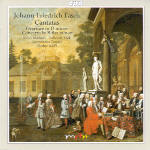German Baroque composer Johann Friedrich Fasch organized a music exchange service between Dresden, Darmstadt, Hamburg, and other cities, which allowed him to know exactly what was new and upcoming. His style, then, often seems to be rooted in his own period, while looking forward to the classical era. He enjoyed writing for the chalumeau, an early French two-keyed clarinet, and this mellow yet agile instrument is featured on three of the pieces here, most notably the concerto in B-flat. Gili Rinot proves a worthy player of this curious instrument, playing with virtuoso flair, yet able to float long, lyrical lines so lovely and sweetly that they seem to hang in the air. The rest of the small chamber orchestra is just as accomplished, with the “French wind trio” of two oboes and bassoon providing pungent contrast to the strings and chalumeau. The vocal soloists are quite good, and director/harpsichordist Shalev Ad-El guides everything with a sure and sensitive hand. Add to the performance virtues superb recorded sound, close up and personal, yet round and full, and you have a release that can be termed an essential Baroque discovery.
































